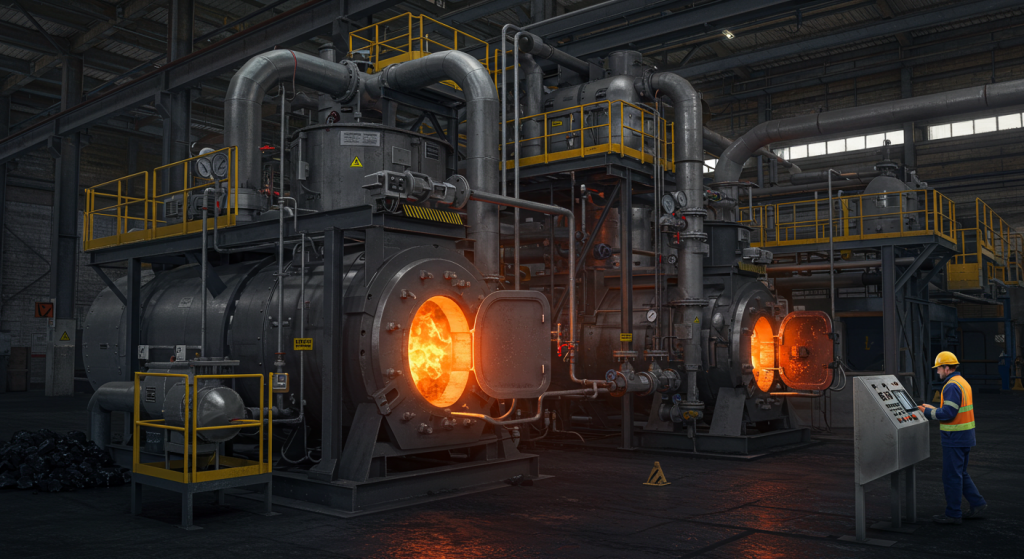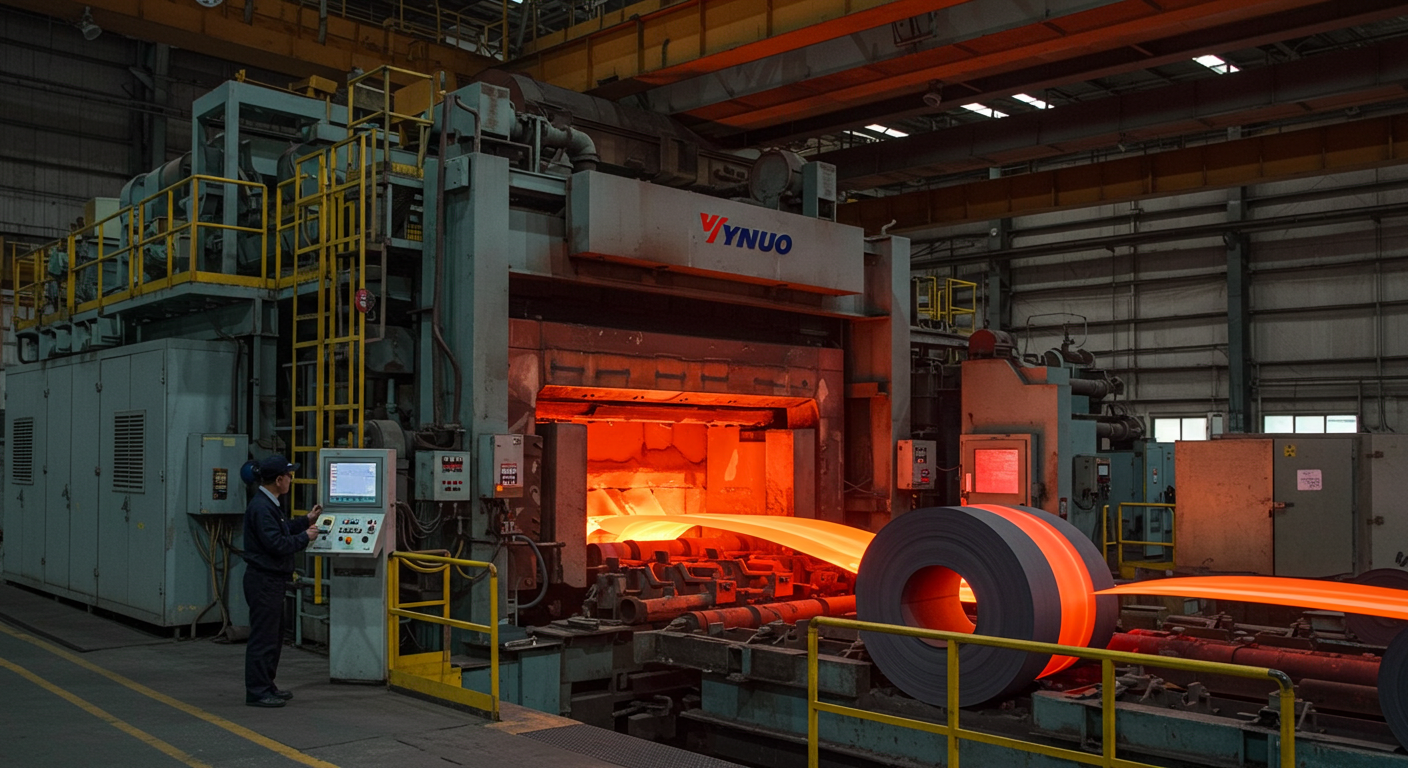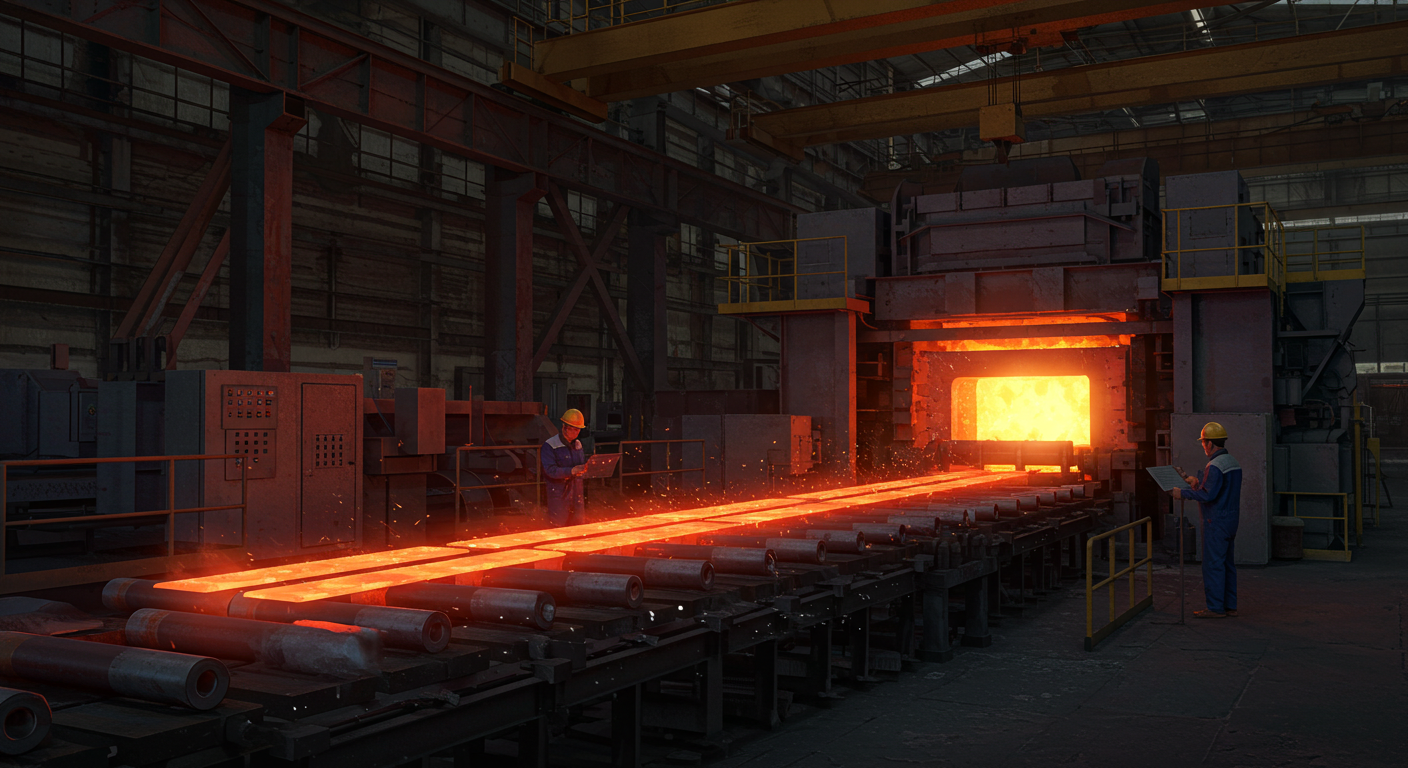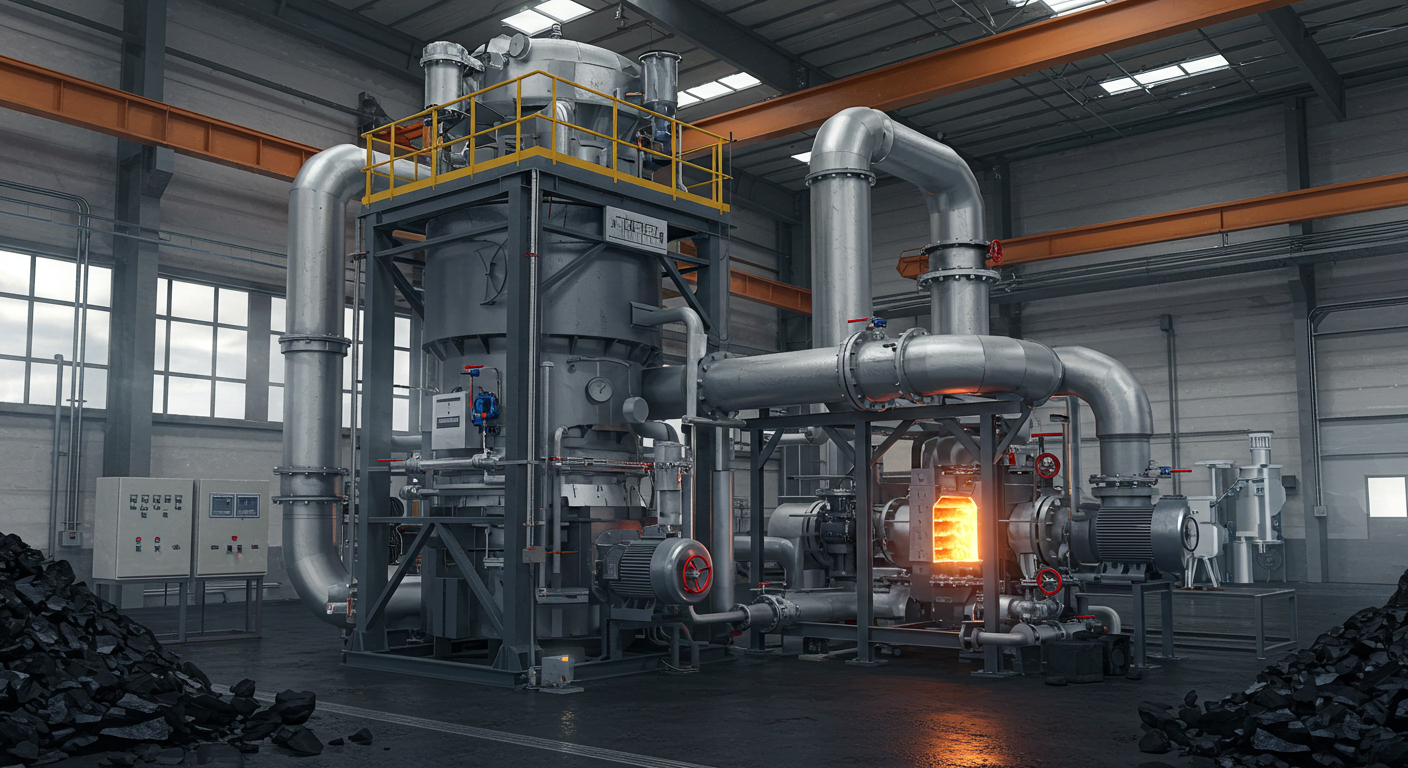
Coal gas furnaces are pivotal in industrial heating, utilizing coal-derived gas to fuel high-temperature processes in steel manufacturing, chemical processing, and energy production. At Jiangsu Yinuo Thermal Energy Technology Co., Ltd., we design and manufacture advanced coal gas furnaces that deliver efficiency, reliability, and environmental responsibility. These furnaces harness the energy of coal gas to power critical applications, from reheating steel billets to supporting industrial kilns.
This guide explores the technology, applications, and maintenance of coal gas furnaces, offering valuable insights for engineers, technicians, and industry professionals. With over 13 years of expertise and multiple patented innovations, Yinuo leads the industry in sustainable furnace solutions. We’ll also examine emerging trends shaping the future of coal gas furnace technology. Discover our cutting-edge furnaces at Our Products and learn how Yinuo is transforming industrial heating.
What Is a Coal Gas Furnace?
A coal gas furnace is an industrial heating system that burns coal gas—produced through coal gasification—to generate high temperatures for processes like steel reheating, annealing, or chemical synthesis. Coal gas, a mixture of carbon monoxide, hydrogen, methane, and other gases, is created by heating coal in a controlled environment, typically via a coal gasifier. These furnaces are integral to industries requiring cost-effective, high-energy heat sources.
Yinuo’s coal gas furnaces are engineered for diverse applications, featuring designs such as pusher-type, rotary hearth, and chamber furnaces. Pusher-type furnaces move materials through heating zones, ideal for continuous steel processing. Rotary hearth furnaces rotate materials for uniform heating, while chamber furnaces suit batch processes. Fuel is supplied by integrated or external coal gasifiers, with options for single-stage or two-stage gasification, as discussed in our Coal Gasifier Technology Guide. Gas-fired systems ensure efficient combustion, with advanced burners optimizing energy use. To explore our furnace range, visit Our Furnace Products.
How Coal Gas Furnaces Work
The operation of a coal gas furnace begins with coal gasification, where coal is heated in a gasifier with limited oxygen to produce coal gas. This gas is cleaned to remove impurities like tar and sulfur, then piped to the furnace burners. The furnace combusts the gas to generate temperatures of 1000–1400°C, depending on the application, heating materials like steel billets or chemical reactants.
Yinuo’s furnaces incorporate sophisticated control systems for precision. Thermocouples monitor temperature, and programmable logic controllers (PLCs) regulate gas flow and burner intensity. Pusher-type furnaces advance materials through preheating, heating, and soaking zones, ensuring uniform temperature. Rotary hearth furnaces rotate materials for even heat exposure, while chamber furnaces maintain stable conditions for batch processing. Advanced burners, often regenerative, recover waste heat, reducing fuel use by up to 50%, as detailed in our Regenerative Burner Technology Guide. Atmosphere control, using nitrogen or carbon dioxide, minimizes oxidation, as explored in our Atmosphere-Controlled Furnaces Guide. Regular maintenance, such as burner cleaning and gasifier checks, ensures efficiency. For customized solutions, contact us at Contact Us.
Types of Coal Gas Furnaces
Coal gas furnaces vary by design, fuel system, and application, each tailored to specific industrial needs:
Pusher-Type Furnaces
These furnaces push materials through heating zones, ideal for continuous processes like steel billet reheating. They offer high throughput but require precise control to avoid material damage.
Rotary Hearth Furnaces
Rotary hearth furnaces rotate materials on a circular hearth, ensuring uniform heating for smaller or irregularly shaped items, such as steel rods or forgings.
Chamber Furnaces
Chamber furnaces process materials in fixed batches, suitable for chemical synthesis or smaller-scale heat treatments, offering flexibility for diverse applications.
Single-Stage Gasifier Furnaces
These use a single gasification stage, producing a simpler gas mixture for basic heating needs, cost-effective for smaller operations.
Two-Stage Gasifier Furnaces
Two-stage gasifiers produce cleaner, higher-quality gas, improving combustion efficiency for demanding applications like steel processing, as in our Coal Gasifier Technology Guide.
Regenerative Burner Furnaces
Equipped with regenerative burners, these furnaces recover waste heat, enhancing energy efficiency for large-scale operations, per our Regenerative Burner Technology Guide.
Yinuo’s coal gas furnaces are designed for reliability and performance. Explore our offerings at Our Furnace Products.
Applications of Coal Gas Furnaces
Coal gas furnaces serve a wide range of industries, leveraging their high-temperature capabilities and cost-effective fuel:
Steel Manufacturing
Furnaces reheat billets, slabs, or blooms for rolling or forging, ensuring malleability for products like rebar or wire rods, as covered in our Steel Processing Furnaces Guide.
Chemical Processing
Coal gas furnaces provide heat for chemical reactions, such as ammonia synthesis or methanol production, where consistent high temperatures are critical.
Energy Production
Furnaces support industrial boilers or kilns, generating steam or heat for power plants or cement production, utilizing coal gas as a low-cost fuel.
Ceramics and Refractories
High-temperature furnaces fire ceramics or refractory bricks, ensuring strength and durability for industrial applications.
Metallurgical Processes
Furnaces heat non-ferrous metals like copper or aluminum for smelting or alloying, benefiting from coal gas’s high energy output.
Small-Scale Industrial Heating
Compact furnaces support local manufacturers, providing affordable heat for forging or heat treatment.
For tailored furnace solutions, visit Our Services.
Benefits of Coal Gas Furnaces
Coal gas furnaces offer significant advantages, making them a preferred choice for industrial heating:
Cost-Effective Fuel
Coal gas, derived from abundant coal resources, is cheaper than natural gas or oil, reducing operational costs.
High Thermal Efficiency
Regenerative burners and optimized combustion systems maximize heat output, minimizing fuel waste.
Versatility
Furnaces support diverse applications, from steel reheating to chemical processing, accommodating various materials and processes.
Scalability
Designs range from compact chamber furnaces to large pusher-type systems, meeting small and large production needs.
Environmental Efficiency
Modern furnaces with scrubbers and regenerative burners reduce emissions, aligning with regulatory standards.
Reliable Performance
Advanced controls ensure consistent heating, improving product quality and process reliability.
Yinuo’s furnaces are engineered to deliver these benefits, ensuring optimal performance. Discover our solutions at Our Furnace Products.
Common Challenges with Coal Gas Furnaces
Despite their advantages, coal gas furnaces face challenges that require proactive management:
Emissions and Environmental Impact
Burning coal gas produces CO2 and pollutants like sulfur dioxide, necessitating scrubbers and emission controls to meet regulations.
Gas Impurities
Tar, ash, or sulfur in coal gas can clog burners or contaminate processes, requiring robust gas cleaning systems.
Temperature Inconsistency
Uneven burner performance or faulty thermocouples can cause non-uniform heating, affecting material quality. Regular calibration is essential.
Component Wear
Burners, refractory linings, and gasifier components degrade under high temperatures, needing frequent maintenance.
Energy Costs
While coal gas is cost-effective, inefficient furnaces consume excess fuel, increasing expenses. Regenerative burners mitigate this.
Safety Concerns
Handling coal gas requires strict safety protocols to prevent leaks or explosions, necessitating advanced monitoring systems.
Yinuo’s advanced designs and maintenance services address these challenges, ensuring reliable operation. Learn more at Our Services.
Maintenance Strategies for Coal Gas Furnaces
Effective maintenance ensures the longevity and efficiency of coal gas furnaces. Yinuo’s furnaces are built for durability, but these strategies maximize performance:
Regular Inspections
Inspect furnaces every 1,000 hours, checking burners, thermocouples, refractory linings, and gasifier components for wear or damage. Verify gas and air supply lines for leaks.
Gas Cleaning System Maintenance
Clean gas filters and scrubbers biweekly to remove tar, ash, or sulfur, ensuring high-quality gas. Test gas purity monthly to prevent burner clogging or process contamination.
Burner and Combustion System Care
Clean burner nozzles weekly to maintain efficient combustion. Calibrate regenerative burners bi-monthly to optimize heat recovery, as outlined in our Regenerative Burner Technology Guide. Inspect burner air intakes for blockages.
Temperature Calibration
Verify temperature uniformity across zones using thermocouples, adjusting PLC settings to maintain precise heating profiles. Conduct calibration checks quarterly to ensure consistent performance.
Refractory and Component Cleaning
Remove scale, ash, or slag from the furnace chamber weekly to prevent heat transfer losses. Clean conveyor rollers or hearths in continuous furnaces to ensure smooth material movement.
Fan and Motor Maintenance
Inspect combustion air fans and blowers for wear, lubricating bearings quarterly to prevent mechanical failures. Check drive systems for alignment and tension.
Safety System Checks
Test gas leak detectors and emergency shut-off valves monthly to ensure safe operation. Train staff on safety protocols, available through Our Services.
Scheduled Downtime
Plan maintenance during low-production periods, logging inspection results, repairs, and component replacements to track furnace health and anticipate future needs.
For professional maintenance support, Yinuo offers comprehensive services to keep your coal gas furnaces operating at peak efficiency. Contact us at Our Services.
Optimizing Coal Gas Furnace Performance
To enhance efficiency and output, consider these optimization strategies:
Energy Efficiency
Integrate regenerative burners to recover waste heat, reducing fuel consumption by 30–50%, as detailed in our Gas-Fired Furnace Guide. Optimize air-to-fuel ratios to improve combustion efficiency.
Automation and Control
Implement PLC-based SCADA systems for real-time monitoring of temperature, gas flow, and burner performance, minimizing errors and improving consistency.
Gas Quality Optimization
Enhance gasifier performance to produce cleaner coal gas, reducing impurities that affect burners or processes. Regular cleaning and advanced filtration systems help, per our Coal Gasifier Technology Guide.
Process Tuning
Adjust heating profiles and material pacing to match specific applications, such as faster cycles for smaller batches or extended soaking for heavy billets.
Component Upgrades
Replace outdated burners, thermocouples, or refractory materials with Yinuo’s advanced components, designed for durability and efficiency, available at Our Furnace Products.
Operator Training
Train staff on furnace operation, safety, and maintenance best practices to ensure optimal performance. Yinuo offers tailored training programs, detailed in Our Services.
These strategies improve productivity, reduce costs, and enhance environmental performance, positioning your operations for success.
Choosing the Right Coal Gas Furnace
Selecting the appropriate coal gas furnace depends on several factors:
Application Requirements
Steel reheating requires high-throughput pusher furnaces, while chemical processing may favor chamber furnaces for batch operations.
Production Volume
Large-scale steel mills benefit from continuous pusher or rotary hearth furnaces, while smaller plants opt for compact chamber designs.
Fuel System
Single-stage gasifiers suit basic heating needs, while two-stage gasifiers provide cleaner gas for precision applications.
Environmental Regulations
Furnaces with scrubbers and regenerative burners meet stricter emission standards, reducing environmental impact.
Budget and Operating Costs
Balance initial investment with long-term fuel and maintenance costs. Regenerative systems offer efficiency to offset expenses.
Automation Needs
High-automation furnaces with SCADA systems suit large operations, while simpler controls fit smaller setups.
Yinuo’s coal gas furnaces are designed to meet these diverse needs, ensuring optimal performance. Explore our solutions at Our Furnace Products or consult our team at Contact Us.
Future Trends in Coal Gas Furnace Technology
The future of coal gas furnaces is driven by innovation, sustainability, and efficiency, with Yinuo leading the charge:
Advanced Automation
Integration of IoT sensors and SCADA systems enables real-time monitoring and predictive control, optimizing combustion and reducing energy waste.
Sustainable Fuel Alternatives
Hydrogen-enriched coal gas and biomass co-firing reduce CO2 emissions, aligning with global sustainability goals. Yinuo is exploring hybrid fuel systems for cleaner operation.
Compact and Modular Designs
Smaller, modular furnaces cater to regional or specialized plants, offering scalability and reduced installation costs.
Smart Maintenance Systems
AI-powered predictive maintenance analyzes sensor data to forecast component wear, minimizing downtime and extending furnace life.
Enhanced Energy Efficiency
Next-generation regenerative burners and advanced heat recovery systems push fuel savings beyond 50%, while high-efficiency refractories reduce heat loss.
Carbon Capture Integration
Emerging carbon capture and storage (CCS) technologies integrate with furnaces to sequester CO2, meeting stringent environmental regulations.
Yinuo’s commitment to innovation ensures our furnaces incorporate these trends, delivering cutting-edge performance. Stay ahead with our solutions at Our Furnace Products.
Conclusion
Coal gas furnaces are essential for industrial heating, powering processes in steel manufacturing, chemical processing, and energy production with cost-effective, high-energy fuel. Jiangsu Yinuo Thermal Energy Technology Co., Ltd. leverages over 13 years of expertise and patented technologies to deliver advanced furnaces, from pusher-type to chamber designs, tailored to meet diverse needs. Effective maintenance, including inspections, gas cleaning, and burner calibration, ensures reliability, while optimization strategies like regenerative burners and automation enhance efficiency. Future trends—hydrogen fuels, AI maintenance, and carbon capture—promise a sustainable, high-tech future. Explore Yinuo’s coal gas furnaces at Our Furnace Products. For customized solutions or support, visit Our Services or Contact Us. Choose Yinuo for innovative, efficient industrial heating.
FAQ
What industries use coal gas furnaces?
Steel, chemical processing, energy, and ceramics, for reheating, synthesis, or firing.
How do single-stage and two-stage gasifiers differ?
Single-stage produce simpler gas; two-stage offer cleaner, efficient gas, per our Coal Gasifier Technology Guide.
How often should a coal gas furnace be maintained?
Inspect every 1,000 hours, per our Heat Treatment Solutions Guide.
What improves energy efficiency in these furnaces?
Regenerative burners, as in our Regenerative Burner Technology Guide.
How to choose a coal gas furnace?
Contact Yinuo at Contact Us for tailored guidance.







